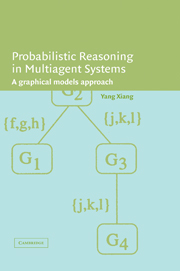
-
Select format
-
- Publisher:
- Cambridge University Press
- Publication date:
- 31 August 2009
- 26 August 2002
- ISBN:
- 9780511546938
- 9780521813082
- 9780521153904
- Dimensions:
- (247 x 174 mm)
- Weight & Pages:
- 0.764kg, 308 Pages
- Dimensions:
- (244 x 170 mm)
- Weight & Pages:
- 0.49kg, 308 Pages
You may already have access via personal or institutional login
Book description
This 2002 book investigates the opportunities in building intelligent decision support systems offered by multi-agent distributed probabilistic reasoning. Probabilistic reasoning with graphical models, also known as Bayesian networks or belief networks, has become increasingly an active field of research and practice in artificial intelligence, operations research and statistics. The success of this technique in modeling intelligent decision support systems under the centralized and single-agent paradigm has been striking. Yang Xiang extends graphical dependence models to the distributed and multi-agent paradigm. He identifies the major technical challenges involved in such an endeavor and presents the results. The framework developed in the book allows distributed representation of uncertain knowledge on a large and complex environment embedded in multiple cooperative agents, and effective, exact and distributed probabilistic inference.
Reviews
Review of the hardback:‘… this is a valuable and welcome comprehensive guide to the state-of-the-art in applying belief networks.’
Source: Kybernetes
Review of the hardback:'… the well-balanced treatment of multiagent systems will make the book useful to both theoretical computer scientists and the more applied artificial intelligence community. Moreover, the interdisciplinary nature of the subject makes it relevant not only to computer scientists but also to people from operations research and microeconomics (social choice and game theory in particular). The book easily deserves to be on the shelf of any modern theoretical computer scientist.'
Source: SIGACT News
Contents
Metrics
Full text views
Full text views help Loading metrics...
Loading metrics...
* Views captured on Cambridge Core between #date#. This data will be updated every 24 hours.
Usage data cannot currently be displayed.
Accessibility standard: Unknown
Why this information is here
This section outlines the accessibility features of this content - including support for screen readers, full keyboard navigation and high-contrast display options. This may not be relevant for you.
Accessibility Information
Accessibility compliance for the PDF of this book is currently unknown and may be updated in the future.


